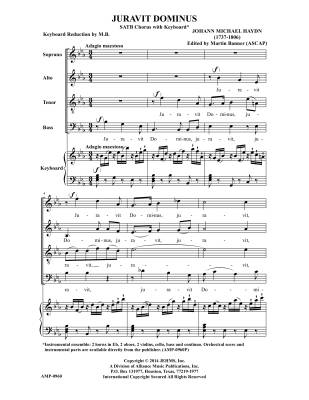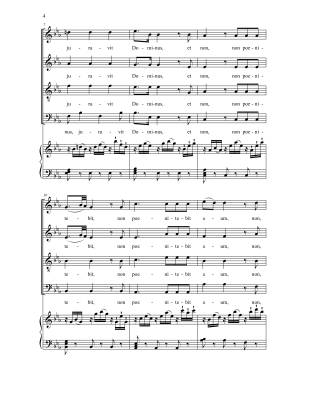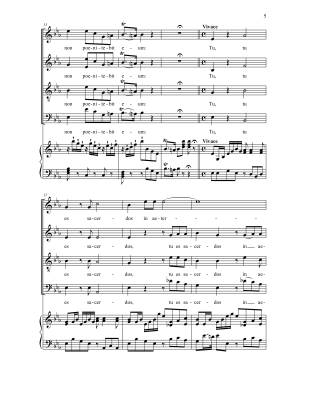Opens in a new window
Alliance Music Pub Juravit Dominus - Haydn/Banner - SATB

Additional Photos:



- Author/Composer:
- HAYDN, JOHANN MICHAEL
- Instrumentation:
- SATB ACCOMP
- Model #:
- AMP0960
Editor: Martin Banner
Format: Choral Octavo
Voicing: SATB with piano accompaniment (optional Orchestral Accompaniment available separately)
Editor's Note:
Johann Michael Haydn (1737 - 1806) was an acclaimed and respected composer during his lifetime. Born in Rohrau, near the Austrian-Hungarian border, Haydn, the younger brother of Joseph Haydn, was a talented young singer who, like his older brother, sang in the famed Vienna Boys Choir. He was appointed as Kapellmeister at the court of Grosswardein (now in present day Hungary) in 1757. Haydn served the Archbishop of Salzburg from 1763 until his death. A prolific composer, he wrote hundreds of compositions including a Requiem which influenced the more famous setting by Mozart.
JURAVIT DOMINUS (MH382) was completed by Haydn on September 4, 1784 in Salzburg. This edition is based upon the autograph score, preserved in the music archive of the Bayerische Staatsbibliothek in Munich: Mus. mss. 395. The score is laid out over nine pages, nine staves per page. The top of the first page of the manuscript reads as follows: Graduale in Solemnitate cujusque S. Confessoris Pontificis. di G. Michele Haydn mpia. This composition is scored for SATB choir, two horns in Eb, two oboes, two violins, cello, bass and continuo. The Latin text is from Dixit Dominus, Psalm 109:4.
Latin
Juravit Dominus, et non poenitebit eum:
Tu es sacerdos in aeternum secundum
ordinem Melchisedech. Alleluja.
English
The Lord swore, and will not repent:
You are a priest forever after the order of Melchisedech. Alleluia.
The present edition adheres closely to the above mentioned source, noting editorial markings in parentheses. Voice parts, where notated in moveable clefs, were rewritten in treble clef; phrase markings in the voice parts were added where two or more notes occurred for a single syllable of text; textual underlay, given generally only in the soprano part, was added to the alto, tenor and bass parts.
This editor is indebted to the Bayerische Staatsbibliothek in Munich for granting permission to publish this modern performing edition. - Martin Banner
Media
Sound Sample
Press play to listen
Q & A
There are currently no questions for this product.
Reviews
There are currently no reviews for this product. Be the first to write one!




